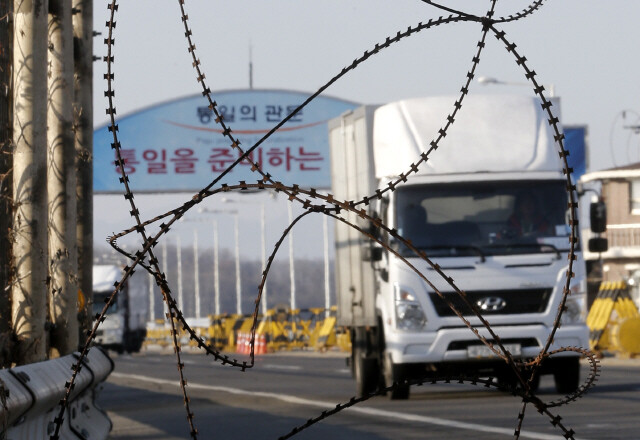hankyoreh
Links to other country sites 다른 나라 사이트 링크
Shutdown of Kaesong Complex a possible response to North Korean rocket launch?

The first response that the South Korean government made after North Korea announced that it would be launching a long-range rocket was to warn the North that it would face “severe consequences.” The same expression was used by South Korean Prime Minister Hwang Kyo-ahn; Cho Tae-yong, deputy chief of the Blue House’s office of national security; Ministry of Unification Spokesperson Jeong Joon-hee; and South Korea’s Ministry of Foreign Affairs Spokesman Cho Joon-hyuk.
This raises the question of what these “severe consequences” might be. The South has already resumed propaganda broadcasts on loudspeakers located on the DMZ. Immediately after the nuclear test, South Korea reduced the number of workers staying at the Kaesong Industrial Complex to the minimum number possible, but it explained this as a measure to ensure the safety of South Korean citizens, and not as sanctions. Trade between North and South Korea has been suspended for seven years, following the May 24Measures, a response to the sinking of the South Korean Navy’s Cheonan corvette. This is why the South Korean government modified “severe consequences” with the phrase “from the international community.”
It appears that some officials in the Blue House and other ministries have not quite ruled out the possibility of a complete shutdown of the Kaesong Complex. “The question of whether we will need to take additional measures in regard to the Kaesong Complex depends on North Korea,” Park said during a press conference for the New Year.
On Feb. 3, immediately after North Korea announced that it would launch a rocket, Ministry of Unification Spokesman Jeong Joon-hee avoided comment. “Even giving specifics [about shutting down the Kaesong Complex] would be the same as laying our chips on the table,” Jeong said. The tone of these remarks departs from the government’s previous stance that the Kaesong Complex was not to be a means of sanctions.
Park’s words could come back to haunt her. They may well be assumed to mean that South Korea will take additional measures in regard to the Kaesong Complex if North Korea launches a missile.
But shutting down the Kaesong Complex would not be a very effective form of sanctions. North Korea’s annual profit from the Kaesong Complex is estimated to be between US$80 million and $100 million, about 30% of which ends up with the central government. Considering that the volume of trade between North Korea and China is around US$6.3 billion, it’s unlikely that shutting down the complex would inflict a crippling economic blow on North Korea.
On the other hand, South Korean companies in the Kaesong Complex would be expected to suffer considerable harm. The value of goods produced by tenant companies at the complex between Jan. and Nov. of 2015 was US$515.49 million.
“We can’t rule out the possibility that the Kaesong Complex will be included in the UN Security Council sanctions,” a South Korean government official said. This suggests that, while the government is reluctant to touch the complex itself, its hands would be tied if the complex was included in international sanctions.
By Kim Jin-cheol, staff reporter
Please direct questions or comments to [english@hani.co.kr]

Editorial・opinion
![[Column] Park Geun-hye déjà vu in Yoon Suk-yeol [Column] Park Geun-hye déjà vu in Yoon Suk-yeol](https://flexible.img.hani.co.kr/flexible/normal/500/300/imgdb/original/2024/0424/651713945113788.jpg) [Column] Park Geun-hye déjà vu in Yoon Suk-yeol
[Column] Park Geun-hye déjà vu in Yoon Suk-yeol![[Editorial] New weight of N. Korea’s nuclear threats makes dialogue all the more urgent [Editorial] New weight of N. Korea’s nuclear threats makes dialogue all the more urgent](https://flexible.img.hani.co.kr/flexible/normal/500/300/imgdb/original/2024/0424/7317139454662664.jpg) [Editorial] New weight of N. Korea’s nuclear threats makes dialogue all the more urgent
[Editorial] New weight of N. Korea’s nuclear threats makes dialogue all the more urgent- [Guest essay] The real reason Korea’s new right wants to dub Rhee a founding father
- [Column] ‘Choson’: Is it time we start referring to N. Korea in its own terms?
- [Editorial] Japan’s rewriting of history with Korea has gone too far
- [Column] The president’s questionable capacity for dialogue
- [Column] Are chaebol firms just pizza pies for families to divvy up as they please?
- [Column] Has Korea, too, crossed the Rubicon on China?
- [Correspondent’s column] In Japan’s alliance with US, echoes of its past alliances with UK
- [Editorial] Does Yoon think the Korean public is wrong?
Most viewed articles
- 1[Column] Park Geun-hye déjà vu in Yoon Suk-yeol
- 2Will NewJeans end up collateral damage in internal feud at K-pop juggernaut Hybe?
- 3N. Korean hackers breached 10 defense contractors in South for months, police say
- 4[Guest essay] The real reason Korea’s new right wants to dub Rhee a founding father
- 5Up-and-coming Indonesian group StarBe spills what it learned during K-pop training in Seoul
- 6[Editorial] Japan’s rewriting of history with Korea has gone too far
- 7Why Korea shouldn’t welcome Japan’s newly beefed up defense cooperation with US
- 8Terry Anderson, AP reporter who informed world of massacre in Gwangju, dies at 76
- 9Thursday to mark start of resignations by senior doctors amid standoff with government
- 10Senior doctors cut hours, prepare to resign as government refuses to scrap medical reform plan